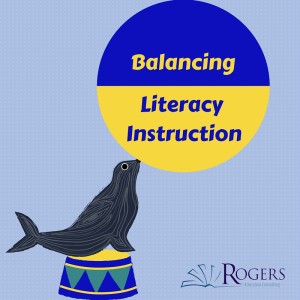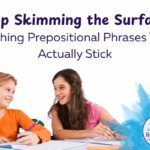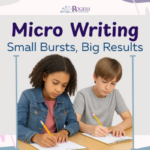Welcome to Part Two of my series on balancing literacy instruction! While I’m a huge fan of explicit instruction, the benefits of implicit instruction are also great. What’s a teacher to do??
Just joining us? Make sure you check out the first post in this series: Challenging Text VS Instructional Level Text
Part Two: Explicit Instruction VS Implicit Instruction
With the shift of emphasis onto balanced literacy instruction and Readers’ and Writers’ Workshop model, explicit instruction has become widely accepted as best practice instruction in language arts. In Readers’ Workshop, metacognitive instruction, or instruction to help readers become aware of their own thinking, is a major goal. Explicit instruction is required in order to teach these metacognitive techniques. In essence, explicit instruction means clear, organized and thorough explanation of the strategy (Archer, & Hughes, 2011). During explicit instruction, the teachers much explain when, why, and how the strategies are used, so that students will learn how to use the strategies independently.
In direct contrast, implicit instruction does not clearly explain what is being learned. Instead, the instructor presents information or a problem and the student is given time to problem solve, draw their own conclusions, and comprehend the information in a way that makes sense to them. Implicit instruction is growing in popularity, especially in science classrooms, possibly due to the growth of makerspaces, genius hour, hour of code, growth mindset, etc.
So again, with research supporting these two conflicting instructional methods, which is best? While I wish there was one clear answer, the best choice depends on your teaching style, the students in your class, the content you are teaching, and the objective of the  lesson being taught. These variables could change multiple times throughout the day! Teaching is a science, and there isn’t a single program or one definitive way to instruct. With the knowledge of both explicit and implicit instructional methods, teachers must balance the two to meet the needs of the students. While there is extensive research supporting each individual teaching method, a study from Vanderbilt (2012) reveals that neither method was better than the other for average students learning new words. However, students who were struggling benefited from explicit instruction in learning new words. I have found similar results in my own personal teaching. Explicit instruction is systematic, well thought out, and intentional in nature. This type of instruction is not only powerful for struggling learners, but for learning new information. Implicit instruction is great to get the students thinking critically and learning how to think for themselves and make sense out of information given to them. There is an argument to be made for both ways!
lesson being taught. These variables could change multiple times throughout the day! Teaching is a science, and there isn’t a single program or one definitive way to instruct. With the knowledge of both explicit and implicit instructional methods, teachers must balance the two to meet the needs of the students. While there is extensive research supporting each individual teaching method, a study from Vanderbilt (2012) reveals that neither method was better than the other for average students learning new words. However, students who were struggling benefited from explicit instruction in learning new words. I have found similar results in my own personal teaching. Explicit instruction is systematic, well thought out, and intentional in nature. This type of instruction is not only powerful for struggling learners, but for learning new information. Implicit instruction is great to get the students thinking critically and learning how to think for themselves and make sense out of information given to them. There is an argument to be made for both ways!
Personally, I prefer to introduce new and difficult topics using explicit instruction. For example, when introducing the concept of main idea, I explain to the students in a mini-lesson how, when, and why readers determine the main idea of a text. I model for students how to use this reading strategy and guide them in conferences and in small group to help them use the strategy themselves. Once a majority of the students have a handle on using the strategy, I present lessons using implicit instruction. I provide a text and ask thought provoking questions that will get the students working and thinking on their own, using the previously taught strategies in their open discussion about the text.
Which method of instruction do you practice most often? Which gets you the best results in your classroom?
Up next: Fiction VS Nonfiction



